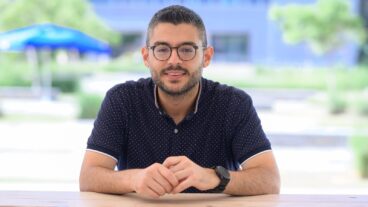Yves Bitton always knew he wanted to be a doctor. But the energetic Israeli couldn’t repress his entrepreneurial spirit. The result: Bitton has founded a series of companies – including the world renown Second Opinion International – that harness high-tech advances in order to make high-quality health care more accessible and user-friendly worldwide.
Bitton began overcoming challenges at a young age. He immigrated to Israel with his parents and seven siblings from Morocco in 1959, and the family struggled to start over in their new home. With great determination and with assistance by a scholarship organization aimed at helping North African immigrants, Bitton was able to attend college and medical school.
His leadership entrepreneurial bent – and feeling of social responsibility – first manifested itself as a medical student and head of the medical student council at Ben-Gurion University of the Negev, where he founded a pioneer volunteer project to teach prisoners incarcerated in a local correction facility about health education.
“That gave me the idea to bring health education into the schools, and before I knew it, I had 150 students volunteering,” Bitton told ISRAEL21c. “Today, the program has expanded to medical schools around the country, and students are able to get scholarship credit for their work. Health education can be used effectively to address the problem of violence in the schools. One way to fight violence is to teach children the genuine damage that is done to the body by hitting and punching.”
Creating these programs as a student was Bitton’s first taste of entrepreneurship and “the pure joy of building something from the ground up.”
In addition to joy, however, Bitton found it financially necessary to look beyond the practice of medicine. After graduation, he moved to Tel Aviv to continue his training as a resident in a hospital, which brought, to his dismay, a “starvation salary.”
“I knew that I wanted to be a doctor, but I couldn’t let my family starve.”
He took a year off from his medical training and founded a computer company – he had taught himself computer skills. Once the company was profitable, he trained his wife to run the company and “when I felt like I could breathe financially,” he returned to the hospital to complete his training.
But he was soon back in the business world. As he practiced as a doctor, he couldn’t help but observe potential market niches for business.
“As I trained in internal medicine, I saw hundreds of people coming to the emergency room in the middle of the night. I thought to myself, why should they have to do this? Why can’t the emergency room come to them?”
This led to the idea for the first medical company he founded, ‘Doctors on Call’, which provides an alternative to expensive emergency room visits. The company offers a database of physicians who are dispatched to people’s homes. He marketed the plan to various insurance companies who signed up their customers on a subscription basis. The service became popular, and is now a standard add-on on option insurance policies in Israel.
But his ideas didn’t stop there, and opportunities continued to expand.
“Over time, two important developments occurred,” he recounts. “Communications ability developed and there is a growing concern in Israel with the overuse of medical services. As a doctor, I saw that there were too many operations and procedures that were often unnecessary.”
He came up with the idea of offering second opinions from doctors who came from outside the patients’ medical provider and could therefore offer a completely objective opinion with no financial interest in recommending unnecessary procedures.
This led to his second company Second Opinion International, a global telemedicine firm that combines medical expertise with state-of-the art technology to offer a network of doctors who can give patients an independent second opinion on any course of treatment.
The Second Opinion service from Second-Opinion International provides fast and reliable feedback and information to the subscriber, and the subscriber’s doctor. All stages may take place via video-conference or in person at the Second-Opinion branch office.
Second-Opinion International has grown to become the leading global provider of advanced telemedicine applications and services, with affiliations in more than 67 countries. The service provides subscribers with access to long distance consultation for expert medical diagnosis.
In order to confirm the correctness of a first diagnosis, minimize the risks and percentage of mistakes and assure peace-of-mind to the patient and his or her family, Second Opinion provides the security of an expert second diagnosis from a senior specialist physician at one of the leading and fully equipped hospitals in the US.
By providing a second diagnosis of the highest possible professional standard, the Second Opinion service ensures that every precaution is taken to guarantee that the patient receives the necessary and correct treatment.
Through joint venture agreements with several of the top ten hospitals in the US, including the University of California Medical Center, San Francisco and Columbia University, New York, subscribers benefit from top-level professional expertise and experience, and are assured of the very best quality health care and medical attention.
Second-Opinion branches have sprouted around the world besides Israel – including Hong Kong, India, Italy, Korea, Morocco, Philippines and Slovenia. Additional branches are opening soon in Brunei, Romania, Singapore, Sri Lanka and Turkey.
Second-Opinion International services are provided by an increasing number of major insurance firms and corporations including AIG, American Express, Europe Assistance, Generali Insurance, Loyal Bank, ManuLife and Mondial Assistance.
Bitton’s latest venture is his most ambitious, and builds on the international success of his first two companies.
Founded in late 2003, Matrix-Medical is the hub of a series of companies that offer information and assistance to make medical services more efficient in countries around the world. Named after the film The Matrix, the company’s Internet database of medical knowledge and services emphasizes preventive medical care.
Bitton views the company as part of health care reform that puts the patient at the center of the system, and sees it as a way to integrate all of the ideas he has had so far. His ideas have taken him to Moldova, the Ukraine, Russia, Great Britain and Switzerland.
One of his central ideas is a company called Home-pital – known in some countries as Casmedica, which promotes the concept that many medical conditions can be treated while the patient is comfortably at home instead of in the hospital, using technology such as videoconferencing and telemedicine. Subscribing patients have access to the expertise of doctors and nurses while remaining comfortably at home.
All together, he has 12 Internet-related projects moving forward from his Ramat Gan offices, where he has eight employees. Some of the companies deal with medical information, others market medical accessories, and some are developing telemedicine projects.
“It is growing all the time – like a matrix. The idea at the end is that everyone will be connected and that there is no need for borders in medical treatment and that a high standard of care would be accessible to everyone.”
If he still has a dream remaining, it is “to build an international HMO at reasonable prices, something that everyone can afford and services that can make a real difference. If you can get a doctor to come to your house, easily get a second opinion, use medical equipment at home instead of being in a hospital, that’s a real difference.”
As he travels, he finds it advantageous to be identified as an Israeli.
“Israel has an excellent name, in east and western Europe in terms of technological innovation.”
Once he is established in Europe, he plans to move into the U.S. market, offering telemedicine services and preventative medicine services to the millions of Americans who are uninsured.
Hopefully, someday, “for a small amount of money patients could purchase services on a subscription or as need basis – [if they need] a doctor to come visit them at their home, a few weeks of tele-nursing services through videoconferencing – whatever their needs are, whenever their needs arise.”












